| Listing 1 - 10 of 30 | << page >> |
Sort by
|
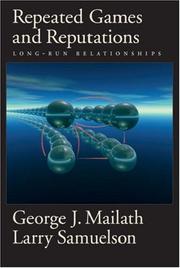
ISBN: 9780195300796 9780195300796 0195300793 Year: 2006 Publisher: New York: Oxford university press,
Abstract | Keywords | Export | Availability | Bookmark
 Loading...
Loading...Choose an application
- Reference Manager
- EndNote
- RefWorks (Direct export to RefWorks)
Operational research. Game theory --- Game theory --- Economics, Mathematical --- 519.3 --- Economics --- Mathematical economics --- Econometrics --- Mathematics --- Games, Theory of --- Theory of games --- Mathematical models --- Methodology
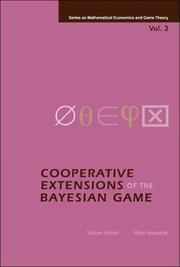
ISBN: 9812563598 9789812563590 9786611919689 1281919683 9812774777 9789812774774 9781281919687 Year: 2006 Volume: 3 Publisher: New Jersey: World scientific,
Abstract | Keywords | Export | Availability | Bookmark
 Loading...
Loading...Choose an application
- Reference Manager
- EndNote
- RefWorks (Direct export to RefWorks)
This is the very first comprehensive monograph in a burgeoning, new research area - the theory of cooperative game with incomplete information with emphasis on the solution concept of Bayesian incentive compatible strong equilibrium that encompasses the concept of the Bayesian incentive compatible core. Built upon the concepts and techniques in the classical static cooperative game theory and in the non-cooperative Bayesian game theory, the theory constructs and analyzes in part the powerful n-person game-theoretical model characterized by coordinated strategy-choice with individualistic ince
Game theory --- Bayesian statistical decision theory --- Bayesian statistical decision theory. --- Game theory. --- Bayes' solution --- Bayesian analysis --- Games, Theory of --- Theory of games --- Statistical decision --- Mathematical models --- Mathematics
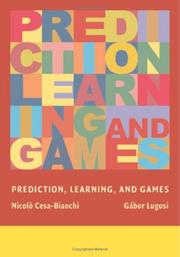
ISBN: 0521841089 9780521841085 9780511546921 0511191782 9780511191787 0511546920 0511189958 9780511189951 051119059X 9780511190599 0511190913 9780511190919 0511191316 9780511191312 1107162955 1280458356 9786610458356 051131602X Year: 2006 Publisher: Cambridge Cambridge University Press
Abstract | Keywords | Export | Availability | Bookmark
 Loading...
Loading...Choose an application
- Reference Manager
- EndNote
- RefWorks (Direct export to RefWorks)
This important text and reference for researchers and students in machine learning, game theory, statistics and information theory offers a comprehensive treatment of the problem of predicting individual sequences. Unlike standard statistical approaches to forecasting, prediction of individual sequences does not impose any probabilistic assumption on the data-generating mechanism. Yet, prediction algorithms can be constructed that work well for all possible sequences, in the sense that their performance is always nearly as good as the best forecasting strategy in a given reference class. The central theme is the model of prediction using expert advice, a general framework within which many related problems can be cast and discussed. Repeated game playing, adaptive data compression, sequential investment in the stock market, sequential pattern analysis, and several other problems are viewed as instances of the experts' framework and analyzed from a common nonstochastic standpoint that often reveals new and intriguing connections.
Game theory. --- Machine learning. --- Computer algorithms. --- Théorie des jeux --- Apprentissage automatique --- Algorithmes --- Théorie des jeux --- Algorithms --- Learning, Machine --- Artificial intelligence --- Machine theory --- Games, Theory of --- Theory of games --- Mathematical models --- Mathematics
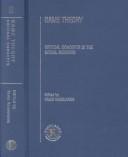
ISBN: 0415222400 0415222419 0415222427 0415222435 0415222443 Year: 2006 Publisher: London New York Routledge
Abstract | Keywords | Export | Availability | Bookmark
 Loading...
Loading...Choose an application
- Reference Manager
- EndNote
- RefWorks (Direct export to RefWorks)
AA / International- internationaal --- 305.6 --- Risicotheorie, speltheorie. Risicokapitaal. Beslissingsmodellen. --- Social sciences --- Mathematical models --- Economics --- Methodology --- Game theory --- Games, Theory of --- Theory of games --- Risicotheorie, speltheorie. Risicokapitaal. Beslissingsmodellen --- Mathematics --- Economics, Mathematical
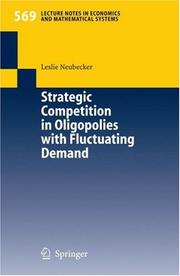
ISBN: 1280461454 9786610461455 3540295577 3540295569 Year: 2006 Publisher: Berlin ; New York : Springer,
Abstract | Keywords | Export | Availability | Bookmark
 Loading...
Loading...Choose an application
- Reference Manager
- EndNote
- RefWorks (Direct export to RefWorks)
Dynamic oligopolistic competition has implications both for the strategic management of firms and for the design of an effective competition policy. Consequently, the present book considers the issue from a private and social perspective. It discusses the potential pro- and anticollusive effects of long-term business strategies, especially for cooperation and reinvestment in production, financing and management compensation, in markets with fluctuating demand. The method of supergame theory is applied to integrate long-run decisions and different types of demand into the analysis. Aside from its contributions to the theoretical literature, the book provides valuable insights into the design of competition policy. The observed development of prices is an indicator of the extent of collusion in the market and can thereby be used to assess antitrust regulation in certain business areas, and to focus the resources of competition authorities on markets where conditions are conducive to collusion.
Oligopolies --- Competition --- Game theory. --- Mathematical models. --- Games, Theory of --- Theory of games --- Mathematical models --- Mathematics --- Leadership. --- Organization. --- Industrial organization. --- Microeconomics. --- Business Strategy/Leadership. --- Industrial Organization. --- Price theory --- Economics --- Industries --- Organization --- Industrial concentration --- Industrial management --- Industrial sociology --- Organisation --- Management --- Ability --- Command of troops --- Followership --- Planning. --- Creation (Literary, artistic, etc.) --- Executive ability
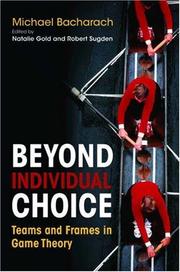
ISBN: 0691120056 9780691120058 0691186316 Year: 2006 Publisher: Princeton, N.J.: Princeton university press,
Abstract | Keywords | Export | Availability | Bookmark
 Loading...
Loading...Choose an application
- Reference Manager
- EndNote
- RefWorks (Direct export to RefWorks)
This is a revision of game theory which takes account of agents' own descriptions of their situations, and which allows people to reason as members of groups. This approach resolves long-standing problems in game-theoretic accounts of cooperation and coordination while still modelling human beings as rational agents.
Operational research. Game theory --- Quantitative methods (economics) --- Game theory --- Economics, Mathematical --- AA / International- internationaal --- 305.6 --- mathematische modellen, toegepast op economie --- speltheorieën --- teamwork --- 330.015193 --- Economics --- Mathematical economics --- Econometrics --- Mathematics --- Games, Theory of --- Theory of games --- Mathematical models --- Risicotheorie, speltheorie. Risicokapitaal. Beslissingsmodellen. --- Methodology --- Risicotheorie, speltheorie. Risicokapitaal. Beslissingsmodellen --- Economics, Mathematical. --- Game theory. --- Gruppe. --- Kooperatives Verhalten. --- Rational Choice. --- Speltheorie. --- Spieltheorie.
Book
ISBN: 1280610654 9786610610655 354032061X Year: 2006 Volume: 39 Publisher: Berlin : Springer-Verlag,
Abstract | Keywords | Export | Availability | Bookmark
 Loading...
Loading...Choose an application
- Reference Manager
- EndNote
- RefWorks (Direct export to RefWorks)
V.A. Vasil’ev and E.B. Yanovskaya 1 Game theory in the USSR before 1990 In this introductory chapter ?rst a short historical information about the development of game theory in the USSR before the 1990s is given. It should help to understand the choice of the papers in this volume. The development of game theory in the USSR began in the early sixties. N.N.Vorob’ev (1925- 1995) was the author of the ?rst papers about game theory in Russian; he was also the leader of a group of PhD students and young researchers at Leningrad who studied this new ?eldinmathematics. The early papers by Vorob’ev on enumerating equilibrium points in - matrix games ([74]), coalitional games where a player may belong to di erent coalitions ([77] and [78]) and equivalence of di erent types of strategies in games in extensive form ([75] and [76]), were published in Soviet journals having English translations, and so they became known in the West. Later on, game theory in the USSR exhibited signi?cant progress, which deserved world-wide attention. However, many game-theoretic papers were published in Soviet journals and edited volumes which have never been translated into English. In the 1960s, the theory of zero-sum games was popular in the USSR.
Game theory. --- Equilibrium (Economics) --- Games, Theory of --- Theory of games --- Mathematical models --- Mathematics --- DGE (Economics) --- Disequilibrium (Economics) --- DSGE (Economics) --- Dynamic stochastic general equilibrium (Economics) --- Economic equilibrium --- General equilibrium (Economics) --- Partial equilibrium (Economics) --- SDGE (Economic theory) --- Economics --- Statics and dynamics (Social sciences) --- Economic theory. --- Economic Theory/Quantitative Economics/Mathematical Methods. --- Economic theory --- Political economy --- Social sciences --- Economic man
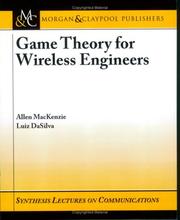
ISBN: 1598290177 1598290169 9781598290172 9781598290165 Year: 2006 Volume: 1 Publisher: San Rafael: Morgan & Claypool,
Abstract | Keywords | Export | Availability | Bookmark
 Loading...
Loading...Choose an application
- Reference Manager
- EndNote
- RefWorks (Direct export to RefWorks)
The application of mathematical analysis to wireless networks has met with limited success, due to the complexity of mobility and traffic models, coupled with the dynamic topology and the unpredictability of link quality that characterize such networks. The ability to model individual, independent decision makers whose actions potentially affect all other decision makers makes game theory particularly attractive to analyze the performance of ad hoc networks.
Game theory. --- Algebra. --- Wireless communication systems --- Mathematical models. --- Communication systems, Wireless --- Wireless data communication systems --- Wireless information networks --- Wireless telecommunication systems --- Games, Theory of --- Theory of games --- Wireless networks. --- Communications theory. --- Wireless communications. --- Distributed protocols. --- Optimization. --- Telecommunication systems --- Mathematics --- Mathematical analysis --- Mathematical models
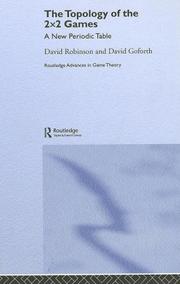
ISBN: 113430692X 128021791X 9786610217915 0203340272 9780415654586 9780415336093 0415336090 0415654580 9780203340271 9781134306879 9781134306916 9781134306923 Year: 2006 Publisher: London ; New York : Routledge,
Abstract | Keywords | Export | Availability | Bookmark
 Loading...
Loading...Choose an application
- Reference Manager
- EndNote
- RefWorks (Direct export to RefWorks)
Game theory has implications for all the social sciences and beyond. It now provides the theoretical basis for almost all teaching in economics, and 2x2 games provide the very basis of game theory. Here, Goforth and Robinson here have delivered a well-written and knowledgeable, 'periodic table' of the most common games including:* the prisoner's dilemma* coordination games* chicken* the battle of the sexes.This book will provide a valuable reference for students of microeconomics and business mathematics.
Game theory. --- Microeconomics --- Topology. --- Study and teaching --- Simulation methods. --- Analysis situs --- Position analysis --- Rubber-sheet geometry --- Price theory --- Games, Theory of --- Theory of games --- Game theory --- Topology --- Théorie des jeux --- Topologie --- Simulation methods --- Geometry --- Polyhedra --- Set theory --- Algebras, Linear --- Economics --- Mathematical models --- Mathematics

ISBN: 128081716X 9786610817160 1402050089 1402050070 9048172535 Year: 2006 Publisher: Dordrecht : Springer,
Abstract | Keywords | Export | Availability | Bookmark
 Loading...
Loading...Choose an application
- Reference Manager
- EndNote
- RefWorks (Direct export to RefWorks)
Reprinted by popular demand, this monograph presents a comprehensive study of positive operators between Riesz spaces and Banach lattices. Since the first publication of this book, (Academic Press, 1985), the subject of positive operators and Riesz spaces has found many applications in several disciplines, including social sciences and engineering. It is well known that many linear operators between Banach spaces arising in classical analysis are in fact positive operators. Therefore we study here positive operators in the setting of Riesz spaces and Banach lattices and from both the algebraic and topological points of view. Special emphasis is given to the compactness properties of positive operators and their relations to the order structures of the spaces the operators are acting upon. In order to make the book as self-sufficient as possible, some basic results from the theory of Riesz spaces and Banach lattices are included with proofs where necessary. However, familiarity with the elementary concepts of real analysis and functional analysis is assumed. The book is divided into five chapters, each consisting of nineteen sections all ending with exercises designed to supplement and illustrate the material.
Positive operators. --- Operators, Positive --- Linear operators --- Computer science. --- Global analysis (Mathematics). --- Mathematics. --- Mathematics of Computing. --- Analysis. --- Applications of Mathematics. --- Game Theory, Economics, Social and Behav. Sciences. --- Math --- Science --- Analysis, Global (Mathematics) --- Differential topology --- Functions of complex variables --- Geometry, Algebraic --- Informatics --- Computer science—Mathematics. --- Mathematical analysis. --- Analysis (Mathematics). --- Applied mathematics. --- Engineering mathematics. --- Game theory. --- Games, Theory of --- Theory of games --- Mathematical models --- Mathematics --- Engineering --- Engineering analysis --- Mathematical analysis --- 517.1 Mathematical analysis
| Listing 1 - 10 of 30 | << page >> |
Sort by
|

 Search
Search Feedback
Feedback About UniCat
About UniCat  Help
Help News
News